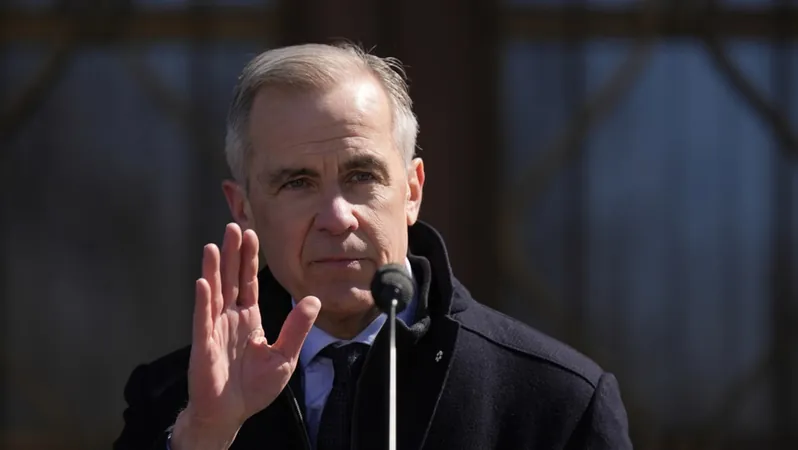
Canadian PM Carney Calls Snap Election, Accuses Trump of Threatening Sovereignty
2025-03-23
Author: John Tan
Canadian PM Carney Calls Snap Election, Accuses Trump of Threatening Sovereignty
OTTAWA — In a bold move, Canada’s new Prime Minister Mark Carney has declared a snap election to be held on April 28, emphasizing the urgent need for a strong mandate to confront what he believes is a looming threat from U.S. President Donald Trump. Carney stated, "President Trump wants to break us so America can own us," highlighting the deteriorating relations between Canada and its southern neighbor.
The relationship between Canada and the U.S. has taken a sharp downturn following Trump's imposition of tariffs on Canadian goods and provocative remarks suggesting the possibility of annexing Canada as the 51st state. These dramatic claims reflect the growing tensions that have arisen since Trump took office.
Carney, who assumed the role of Prime Minister just nine days ago, aims to capitalize on his party's renewed popularity in the wake of declining approval for Trump. The timing is crucial, as the next regular election was not scheduled until October 20. In the face of ongoing threats from the U.S. administration, Carney acknowledges the challenges that Canadian sovereignty faces.
During a press conference, Carney pointed to Trump's actions as unprecedented, declaring, "We are facing the most significant crisis of our lifetimes because of President Trump's unjustified trade actions and his threats to our sovereignty." His remarks came right after the governor general approved his request for an election, suggesting a strategic approach to secure public support against the backdrop of escalating U.S. tariffs.
According to polling data from Nanos Research, Canadian voters are increasingly concerned about the potential impact of Trump's policies on their economy, which Carney hopes to address with promises of cutting the lowest income tax bracket by one percentage point. The Liberal Party, under Carney’s leadership, has made a surprising recovery in polls, with current estimates placing them slightly ahead of the Conservative Party.
The shift in voter sentiment signifies a broader focus on leadership and immediate threats, moving away from long-standing issues that previously dominated the electoral landscape. Experts suggest that the Conservative Party's attacks against Carney are somewhat muted at the moment, as the electorate prioritizes today’s challenges over historical grievances.
Carney’s inexperience in the political landscape is a point of contention for his opponents. Meanwhile, Conservative leader Pierre Poilievre, who has extensive political experience and fluency in French, has already begun to capitalize on Carney's vulnerabilities.
Despite criticism, observers like Laura Stephenson, a political analyst, suggest that the unpredictable nature of Trump’s influence might work in Carney's favor, potentially granting him a degree of leniency from voters. Current polls show public support for the Liberals at around 42 percent, with the Conservatives close behind at 37 percent, indicating a competitive electoral climate as Canadians head to the polls.
In this critical moment, with national sovereignty and economic stability hanging in the balance, Canadians will have to choose their path forward. Can Carney rally support against the formidable pressure from the U.S. administration, or will the Conservative Party’s experience and strategy turn the tide in their favor? The upcoming election promises to be a defining moment in Canadian politics.


 Brasil (PT)
Brasil (PT)
 Canada (EN)
Canada (EN)
 Chile (ES)
Chile (ES)
 Česko (CS)
Česko (CS)
 대한민국 (KO)
대한민국 (KO)
 España (ES)
España (ES)
 France (FR)
France (FR)
 Hong Kong (EN)
Hong Kong (EN)
 Italia (IT)
Italia (IT)
 日本 (JA)
日本 (JA)
 Magyarország (HU)
Magyarország (HU)
 Norge (NO)
Norge (NO)
 Polska (PL)
Polska (PL)
 Schweiz (DE)
Schweiz (DE)
 Singapore (EN)
Singapore (EN)
 Sverige (SV)
Sverige (SV)
 Suomi (FI)
Suomi (FI)
 Türkiye (TR)
Türkiye (TR)
 الإمارات العربية المتحدة (AR)
الإمارات العربية المتحدة (AR)